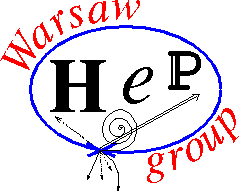SEMINARIUM FIZYKI WIELKICH ENERGII
Dnia 3 marca (piątek) o godzinie 10:15, w sali B2.38 odbędzie się seminarium, na którym zostanie wygłoszony referat pt.:
„Warsaw Active-Target Time Projection Chamber – a powerful tool to study nuclear reactions of astrophysical interests but not only”
Referuje: dr inż. Magdalena Kuich (IFD UW)
Crucial interests in nuclear astrophysics are (p,γ) and (α,γ) reactions. In particular, those that regulate the ratio of C and O and those that burn 18O and, therefore, regulate the ratio between 16O and 18O in the Universe. Such reactions in the stars happen at energies well below the Coulomb barrier and the respective cross-sections are incredibly small, often below the experimental reach. Therefore, the available experimental results on cross-sections for low energies are very sparse, and theoretical extrapolations are burdened with large uncertainties.
An opportunity to elude a part of the experimental limitations is to study the time-reversal reaction, i.e. photo-disintegration. For this purpose, a novel active-target Time Projection Chamber (TPC) optimised for experiments with high-intensity γ-ray beams was developed and built at the Faculty of Physics, University of Warsaw.
Several experiments with the Warsaw active-target TPC were performed in the summer of 2021 at the IFJ PAN Cracow and in the spring and summer of 2022 at HIgS, TUNL, USA.
Preliminary results of the performed measurements at IFJ and HigS will be presented and an outlook on future experiments will be given.
Serdecznie zapraszamy
dr hab. Katarzyna Grzelak
prof. dr hab. Jan Królikowski
prof. dr hab. Aleksander Filip Żarnecki

